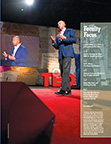Introducing Intisar Rabb
Associate Professor
Printer Friendly VersionGrowing up in the nation’s capital led to an interest in law, says Intisar Rabb, who holds a joint appointment with the Department of Middle Eastern and Islamic Studies at the Faculty of Arts and Sciences. After completing a double major in government and Arabic at Georgetown College, Rabb continued to pursue her dual interests, earning a J.D. from Yale Law School, where she focused on American constitutionalism, legislation, and criminal law, and a Ph.D. in Near Eastern studies from Princeton University, where she won the 2010 Bayard and Cleveland Dodge Memorial Prize for her dissertation.
Rabb has continued to accrue honors; most recently, she was won a grant from the Carnegie Corporation to research criminal law reform in the Muslim world. She is also currently working on a book, The Burden and Benefit of Doubt: Legal Maxims in Islamic Law, which explores the question of how judges make decisions in Islamic legal contexts when the legal texts do not contain clear directions.
In addition to teaching courses on Islamic Law at the Law School, Rabb will also be co-convening the Constitutional Transitions colloquium alongside Professor Sujit Choudhry. In this year’s colloquium, “The Middle East Revolutions,” Rabb hopes to look at the effects of recent developments in the Middle East on the fields of comparative constitutionalism and Islamic constitutionalism. “What does it mean for a constitution to say that Islam is the source of law?” Rabb asks. “And how does that actually translate to laws on the ground, to interbranch relations and judicial review, and to the task of interpretation itself with constitutions containing elements from the Islamic and liberal democratic traditions?”
Rabb is excited to be exploring these issues at NYU, where she is impressed both by the “institutional vibrancy, intellectual resources, and diverse student body,” as well as the commitment to provide programming and training for faculty and students interested in Islamic comparative constitutional law.
—

